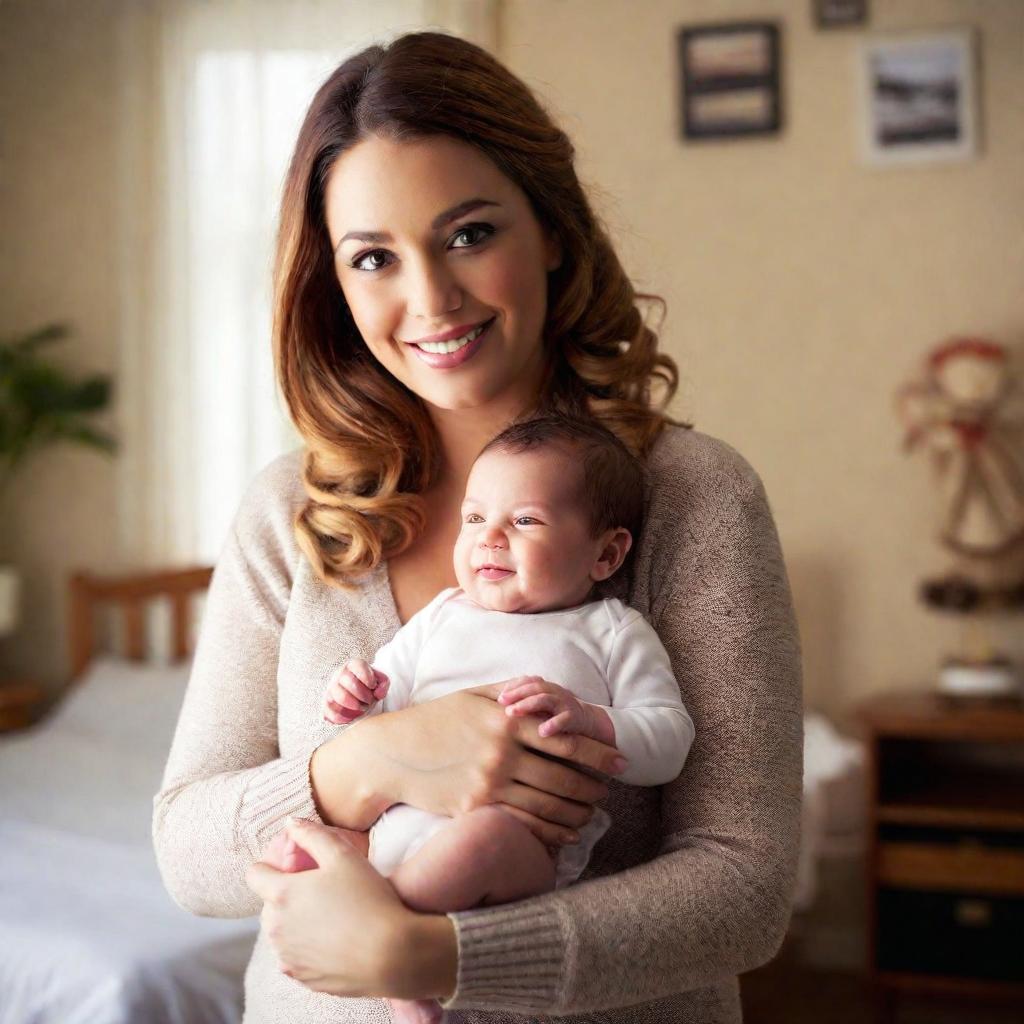Embarking on the journey of early motherhood introduces you to the fascinating world of your baby's motor skills development. As your baby grows, these skills are crucial indicators of their growth, divided into gross motor skills, which involve larger movements like crawling and walking, and fine motor skills, which involve more precise actions such as grasping and manipulating smaller objects.
The first year of your baby's life unfolds a symphony of developmental milestones, each one marking a significant step towards independence and coordination. These milestones are essential not only for your baby's physical growth but also for their cognitive and emotional development. Observing your baby achieve these milestones can be a joyful experience as each achievement reflects their adaptability and growth.
- By 3 months: Your baby may begin to lift their head while lying on their stomach, potentially starting to push up onto their forearms, which preludes rolling over.
- Around 6 months: Sitting up with support and reaching for toys signifies strengthening core and arm muscles.
- At 9 months: Many babies start crawling or creeping, giving them the freedom to explore their surroundings.
- By 12 months: Taking first steps or standing alone are vital indicators of readiness for more complex movements.
It's essential to remember that each child is unique, and their developmental milestones can vary greatly. While some may progress quickly, others might take their time, which is perfectly normal. This diversity does not reflect their potential or future capabilities.
Understanding this variability can offer reassurance during uncertain moments. Shift your focus from timing to celebrating each milestone, however gradual it may seem. This approach supports your baby's confidence and creates a nurturing, pressure-free environment.
If you're concerned about your child's development, trust your instincts and consult a pediatrician who can provide tailored advice and support, considering your baby's overall health and well-being. Armed with accurate information and a supportive community, you'll find reassurance in your nurturing role, guiding your baby confidently along their unique path.
Creating a safe and engaging environment is fundamental in encouraging your baby's motor skills development. A thoughtfully arranged space invites exploration, encouraging active and safe engagement. By setting the right scene, you provide the assurance and encouragement your baby needs to try new movements, which is crucial during these formative stages.
Consider creating a baby-friendly area with soft mats and designated play zones, where your baby can practice and explore with minimal risk. The soft padding provides a cushioned surface, reducing potential bumps during energetic play. Placing age-appropriate toys within reachable distance can also motivate them to reach, grab, and move towards intriguing objects.
- Soft play mats: These gentle cushions create a supportive space for practicing new movements.
- Secure play areas: Using barriers or gates helps define safe boundaries, allowing free exploration while ensuring safety.
- Age-appropriate toys: Choose engaging, safe toys to encourage reaching and exploration.
Sensory play is another dimension that enriches your baby's developmental journey. By incorporating varied textures, sounds, and visually stimulating objects, you provide a tapestry of sensory experiences that enhance motor, cognitive, and emotional growth. Textured toys, crinkly books, or musical instruments stimulate curiosity and motivate movement.
These sensory elements encourage delicate hand and finger movements, intriguing sounds pique curiosity, and vibrant colors captivate little eyes. This multisensory approach lays the groundwork for a lifelong love of learning and exploration, encouraging your child to embrace challenges joyfully.
These moments of play and exploration do more than support motor skills—they create a shared experience of growth and discovery, building memories alongside practical developmental progress. Every smile, every curious gaze, and every grasp marks a step forward, guiding both you and your baby on a path of shared exploration and affection.
Tummy time is a vital yet often celebrated activity in the early development of motor skills. This simple exercise, where your baby lies on their stomach, is essential to strengthening neck and shoulder muscles, foundational for future mobility. It also offers babies a new perspective, fostering curiosity and engagement.
Transform tummy time into an enjoyable routine by using a colorful play mat with toys to catch your baby’s eye. Engage with them by getting down to their level, offering smiles, or singing to keep them entertained. Begin with short sessions and gradually extend them as your baby grows more comfortable.
As your baby becomes accustomed to tummy time, they'll start engaging in reaching and grasping activities. These activities are pivotal in developing hand-eye coordination. Introduce stimulating games involving contrasting toys just out of reach to encourage stretching and grasping.
- Brightly-colored rattles: These captivate and motivate touch while offering visual and auditory stimulation.
- Soft blocks or rings: Easy to hold and versatile for stacking or knocking, these toys introduce cause and effect.
As their motor skills progress, your baby will naturally move into rolling, crawling, and cruising stages. Each stage marks a unique step toward independence. Facilitate this growth by understanding the specifics of each stage.
Encourage rolling by ensuring open, clutter-free spaces. For crawling, position toys slightly ahead to motivate movement. As your baby begins cruising, ensure furniture is stable to prevent falls.
These stages are as much about discovery as they are about skill development. Give your child time and space to explore at their pace, offering support as they navigate these milestones. Every reach and step is a testament to their growing independence and your nurturing support.
Guiding them through these stages enriches physical strength and coordination while strengthening your emotional bond. Celebrate these achievements, knowing each is not simply a step but a leap in their developmental journey.
Selecting toys for motor skills development demands safety and engagement. As your baby grows, choose toys that align with their developmental stage to enhance their experience. Soft blocks and textured balls can stimulate senses; as they become more active, stacking toys or simple puzzles promote problem-solving skills. Choose safe, non-toxic, durable toys that can withstand explorative play.
Interactive play is significant in nurturing motor skills. Bonding games like Peek-a-boo or rolling a ball encourage coordination and connection. Peek-a-boo improves visual tracking and response timing as your baby anticipates and reacts. Rolling a ball teaches giving and receiving, refining hand-eye coordination. These interactions solidify emotional bonds, enriching developmental progress.
Supporting motor skills doesn't have to be expensive. Embrace DIY activities with household items transformed into playthings. A cardboard box becomes a tunnel for crawling; plastic measuring cups are perfect for stacking. Exploring nature by collecting leaves or stones offers free sensory experiences. These DIY activities adapt to curiosity and creativity, inviting interaction within daily life.
Thoughtfully chosen toys, engaging interactions, and creative activities do more than foster motor skills; they support holistic development. Each toy and interaction enriches their world, laying a foundation for exploration and learning. Moments, whether structured or spontaneous, weave a development tapestry nurturing body and heart.
Watching your child grow can sometimes lead to concerns about progress. Recognizing potential signs of motor skill delays is key. Children develop at their pace, but certain signs might require professional advice—difficulty controlling head movements by six months, not sitting independently by nine months, or not crawling by one year.
If concerns arise, consulting a pediatrician brings clarity and reassurance. Pediatricians assess milestones and determine if further evaluation or early intervention is needed.
Early intervention is powerful, supporting development with healthcare providers for a collaborative approach. Tailored therapies address specific needs, helping children overcome obstacles. Common interventions like speech and physical therapy focus on enhancing motor skills through exercise and play.
This teamwork between parents and providers creates a supportive environment. Celebrate each step, no matter how small. Healthcare exactly that therapies are engaging and provide positive learning experiences.
Parental concerns about development are natural. Approach feelings with understanding, recognizing the commitment to supporting your child. Connect with support groups for shared experience solace and insight. Open communication with healthcare teams offers reassurance and personalized advice.
Caring for your baby with patience and love is vital. Allow yourself to feel the range of parenting emotions, seeking help when needed. With support and attention, nurture a hopeful environment for your child's pace.
On this journey, relish each exploration opportunity. Celebrate each achievement, open to learning with your child. Mindful observation and empathetic support prepare you for a bright path, using challenges for development and bonding.
Every milestone is a leap toward growth and discovery. Celebrating these moments strengthens bonds and nurtures your child's spirit. Every first brings joy, affirming progress and your role in the journey.
Trusting your instincts is fundamental. These guide your decisions for your child's well-being. You know them best, and intuition is a tool for understanding and responding with care. Trust yourself to harmonize with your baby, creating a strong foundation.
Through the whirlwind of milestones, enjoy each growth phase. Early days, though intense, hold irreplaceable moments of wonder. Embrace each stage, knowing it's filled with joy and learning. Focus on the present, savoring your baby's growing personality with each new ability.
This approach benefits development while enhancing parental emotional resilience. It leads to serene parenting, prioritizing joy over worry.
Through facilitated growth and appreciation, create a nurturing environment where love leads. Your presence and understanding provide warmth and security for thriving.
As days unfold, let watching your child grow fuel your heart, sharing experiences filled with love and patience. Let these experiences be meaningful, knowing each step is a shared extraordinary story.


















